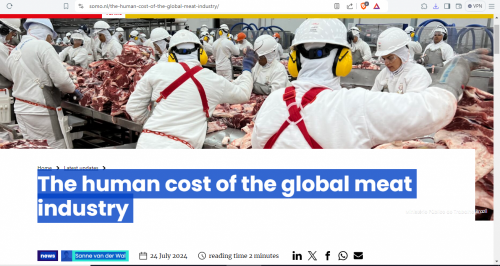
By Sanne van der Wal
https://www.somo.nl/the-human-cost-of-the-global-meat-industry/
The production of meat and dairy takes a huge toll on the environment, biodiversity
, and climate. It uses 78 per cent of all agricultural land, 30 per cent of all water resources, and is responsible for 41 per cent of all deforestation , and 15 per cent of all greenhouse gas emissions. Billions of animals live short and often miserable lives. Additionally, the meat industry has a direct and harmful impact on the people working in it.
Reports from around the world show exhausting working hours, low wages, unhealthy working environments, precarious work and housing arrangements, exploitation, and harassment in meat-processing factories. Working conditions in this sector in Brazil, the world’s leading meat exporting country, have received little attention so far. Together with Repórter Brasil, we investigated health and safety in the Brazilian slaughterhouses of JBS and Marfrig Global Foods, two of the largest meat companies in the world.
Fatal work
Meatpacking workers suffer four times more work-related accidents and ten times more occupational diseases than the average worker in Brazil. Compared internationally, the officially reported incidence of accidents in Brazilian meatpacking is high as well, especially in terms of fatalities.
Beef meatpacking workers, over 137,000 in Brazil, endure long working days in extreme temperatures and noisy and dangerous conditions. They are under continuous pressure to meet high production targets for low pay. Over 80 per cent of the workers interviewed report having work-related illnesses, and 40 per cent have suffered workplace accidents.
Cuts on fingers, hands, arms, and mouths, machines hitting feet or trapping knees, falling reels, and knives and hooks hitting colleagues instead of cattle, are part and parcel of the working conditions. Workers told us that people take painkillers to be able to keep working and not report sick, even when injured, for fear of losing their jobs. Despite having a strong sector-specific health and safety law for over ten years, the Brazilian government still fails to adequately protect meatpacking workers.
Global slaughtering factories
Brazil’s beef industry is dominated by three giant companies: JBS, Marfrig, and Minerva Foods. Loans from national and international banks and funds have enabled these firms to become leading meat companies globally. JBS, with a climate footprint larger than Spain, is the biggest meat company worldwide . The company is planning further expansion by raising funds through a listing on the New York Stock Exchange and a new ultimate holding company in the Netherlands .
The Brazilian beef industry goes to great lengths to cover up any health and safety problems while undermining structural solutions. Companies underreport accidents, mislead government inspections, foster a climate of fear to prevent workers from claiming their rights and retaliate towards those who do. The industry also opposes regulation to improve workplace conditions, and it supports attempts to weaken industry-specific health and safety regulations.
Keeping the meatball rolling
More than ten years ago, the main Brazilian meat-processing companies pledged to block purchases from farms involved in illegal deforestation in the Amazon. They also committed to not buying from farms that operate in protected nature areas or are on the so-called slave labour ‘dirty list’ – the federal government’s list of companies and individuals convicted of modern slavery practices. However, cattle tainted with illegal practices such as deforestation or modern slavery, have continued to reach the meat companies’ slaughterhouses.
“
Meat processing companies hold huge economic and political power. This enables them to continue to abuse workers, animals, communities, and the environment, not only in Brazil but worldwide. It is time that governments do more to address abuses in meat production and that they, with the financial sector, invest in more sustainable food production instead.
Sanne van der Wal specialises in action research on social, economic and environmental issues in international value chains. His work focuses on improving the conditions of workers and communities and addressing negative climate, biodiversity and ecological impacts of production and trade. Approaches that have the potential to transform sectors, such as curbing corporate power concentration and the promotion of supply chain transparency and sustainability standards and regulation, play an important role in his work. Over the years, Sanne has investigated many different companies and sectors at SOMO, however, there is a strong focus on value chains in food and agriculture. Before joining SOMO in 2004, Sanne did research and campaign work for Dutch consumer organisation Goede Waar (formerly Alternative Consumers’ Association) to make production of garments and food more sustainable. Sanne holds a master’s degree in Psychology, majoring in Psychonomics, from the University of Amsterdam.









